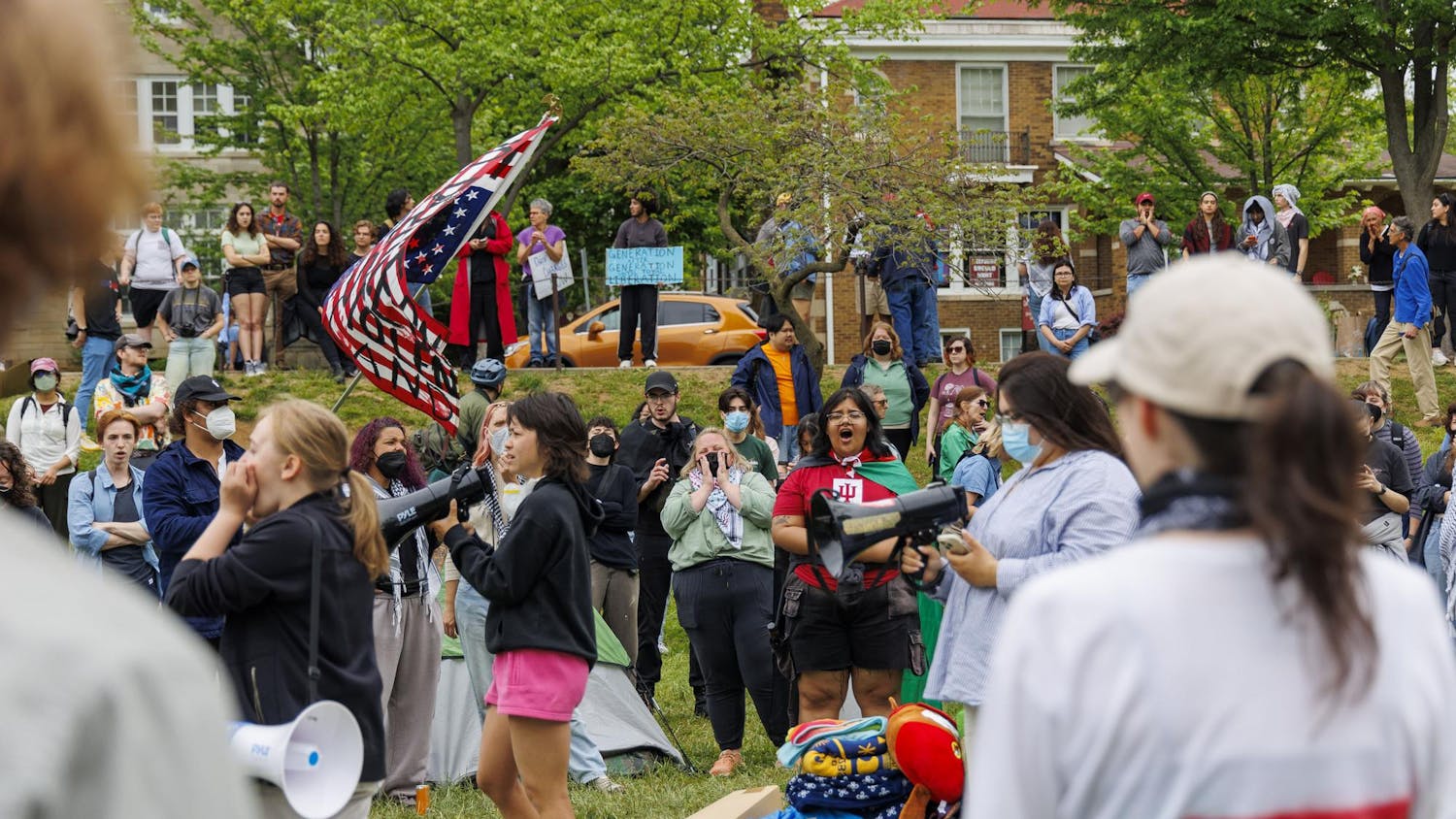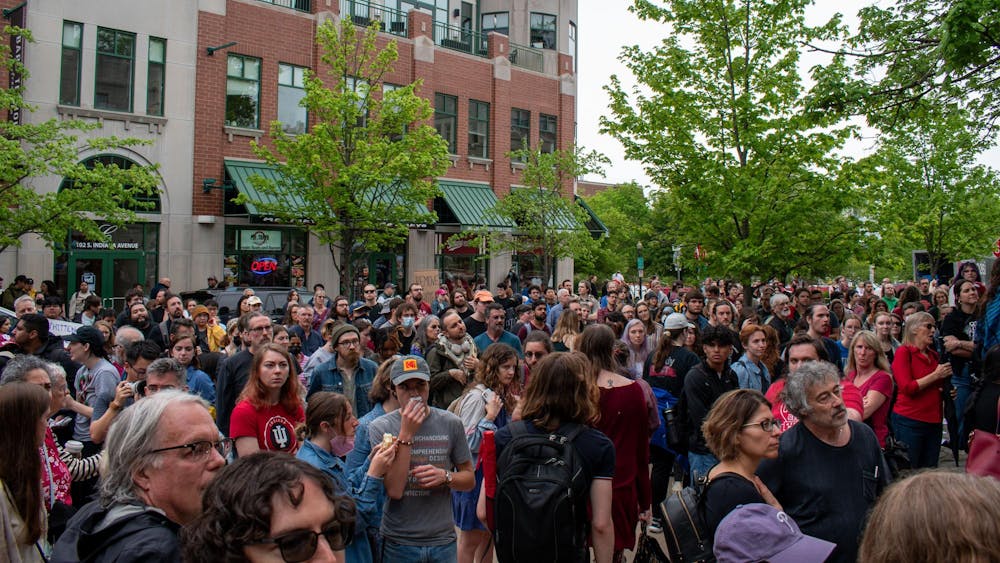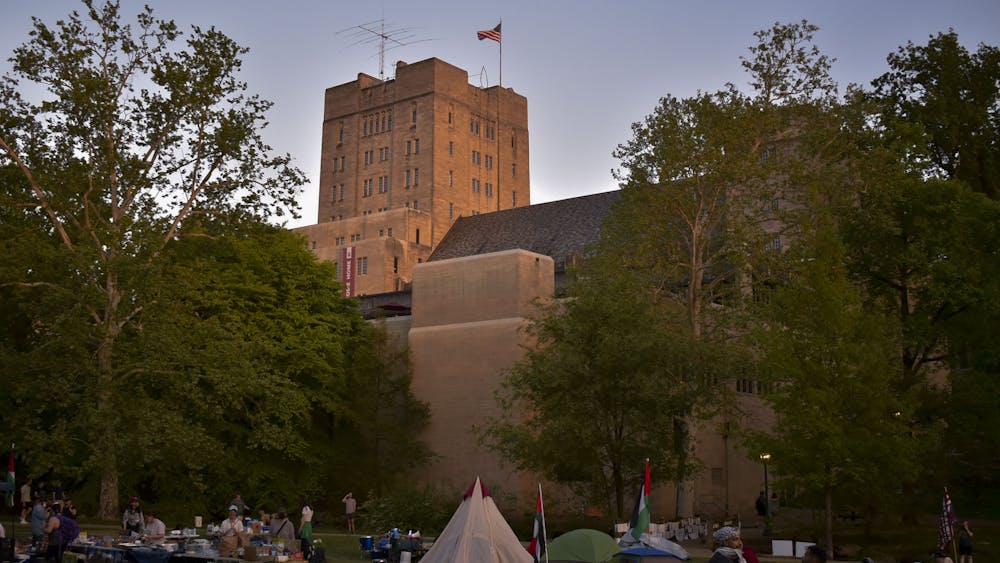It may not be Christmas, but it sure comes close.
Just like he has almost every week for the past four years, Media School associate professor Andrew Weaver was on campus by 7:30 a.m. Wednesday to plan for the 36 hours he said his sons love more than any other time of the year, besides the day they wake up to find presents from Santa under the tree.
As faculty co-adviser of the IU Dance Marathon, the annual fundraiser for Riley Hospital for Children, he especially needed to be there for the first November meeting. It was the last one before the group began setup for IUDM 2016, which starts 8 p.m. Friday.
Like the rest of the IUDM dancers and organizers, Weaver does it “For the Kids.”
Unlike most others, the child that started his involvement with IUDM was his own.
Seven years ago, three months before he was due, Weaver’s oldest son, Owen, came into the world before his body could survive outside the womb. Because of Riley Hospital, he is still alive.
For Weaver, the first 24 hours of his son’s life seem like a bad dream. Although it feels like a lifetime ago, he said he still remembers the jarring silence that filled the room that night.
“There’s no sound, there’s no noise, there’s no baby crying,” Weaver said. “We didn’t know if he was even alive.”
***
When Owen was born, he had no heartbeat, weighed less than 2 pounds and was the size of a Barbie doll.
“It’s not like the kind of experience you imagine to have with your first baby,” said Nicole Martins, Weaver’s wife and associate professor in the Media School.
After his birth at only 28 weeks, Owen was airlifted to the Riley neonatal intensive care unit where he would spend the next four months. Once there, Martins said he continued to struggle every day, even with Riley’s best technology.
“We had no guarantees he was going to make it,” Martins said. “You just had to be grateful for the day you had with him and hope that you’d get another one.”
Martins and Weaver said they remember watching their son struggle with jaundice, infections, potential blindness, hernias, respiratory issues, a heart valve that wouldn’t close properly and bleeding in his brain.
The health issues are normal for premature newborns, Martins said. At six months into a pregnancy, the baby’s still-developing body is unprepared to deal with the atmosphere of the outside world.
“It seemed like every day there was something else,” Weaver said.
Because of Owen’s fragile immune system, the couple said it was weeks before they were allowed to hold their son.
Despite the lack of contact, someone was with Owen for at least nine hours every day. Martins, who was on medical leave through the end of the semester, said she was often the one next to the incubator.
It was the Riley staff that helped her through that difficult time, she said.
“They are a part of my family,” Martins said. “They made all the difference.”
The nurses would take lunch to her or make her go outside and take a walk if she was having a hard time at the hospital that day. At night, when Martins and Weaver were at home, a nurse would send them updates.
When Owen reached 3 pounds, the nurses threw him a party because it meant he could sleep in an open crib and finally wear baby clothes.
“I don’t know how they can have this unending source of compassion and love,” Martins said.
Martins and Weaver said they are still friends with their primary care nurses.
It was also because of the Riley staff that Martins and Weaver felt empowered to have a second child, they said. Martins said she had to go in every week to get a shot that helped prevent a premature birth, but in the end, Elliot’s birth was normal.
Today the parents say both boys are perfectly healthy. Owen is now a vibrant 7-year-old healthy enough to attend public school for second grade.
“He could lick the floor, and he’d be fine,” Martins said.
***
Martins and Weaver began their involvement with IUDM seven years ago after a participant came to ask for donations from one of Weaver’s classes, Martins said.
Once the student found out about Owen’s story, she told his parents to contact IUDM and they would be invited to participate as the family of a Riley patient.
“The kids can’t believe it’s basically this party just for them,” Martins said.
Owen and Elliot are not exceptions to the excitement. They usually know IUDM is coming, but Martins said as of Wednesday, she had yet to tell the boys. She knew they wouldn’t be able to sleep the rest of the week if she did.
Each year, somewhere between 60 and 80 Riley families come to the dance marathon, Weaver said. Some of them come back for decades, but there are always first-timers there as well.
After their initial experience, Martins said her family became involved in other fundraising events outside of the dance marathon the organization puts on throughout the year.
Four years ago, she and Weaver were asked to become co-advisers for IUDM, and they eagerly accepted it.
“It’s not a chore,” Martins said. “We absolutely love it.”
Some of the work they do is working toward more faculty involvement and other similar tasks, Martins said. Weaver said he doesn’t even put in that much work and lets the students take charge instead.
“Our main role as adviser is to stay out of their way,” Weaver said.
For the couple, the students’ work helps remind them how many people care about children who face medical challenges. Martin said the students show energy all year because they are so dedicated to raising money and creating a great dance marathon event.
As a Riley family, Weaver and Martins know the money raised by IUDM, which last year was $3.8 million, contributes to necessary research that leads to more lives like Owen’s being saved every day.
“Every single year, we are amazed all over again at what they can do when they come together like this,” Weaver said.





